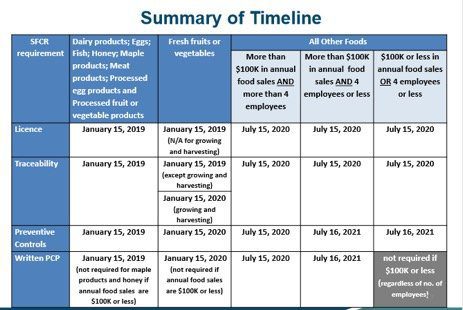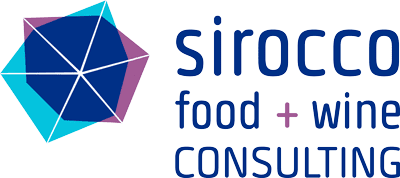The Safe Food for Canadians Act and Regulations came into force on January 15, 2019.1 The new food safety regulations target food for human consumption including ingredients. Requirements are established for food that is imported, exported, or traded between Canadian provinces and territories. Other requirements pertaining to food traceability, labelling and advertising also apply to intra-provincially traded foods (e.g. bilingual labelling).
Licensing
Licensing2 now extends to domestic businesses whose foods were not federally registered before. For the purpose of implementation of the Safe Food for Canadians Regulations (SFCR), CFIA has grouped such foods under the category “All other foods.” The category includes “confectionary, snack foods, beverages, oils, dried herbs and spices, nuts and seeds, coffee and tea, processed grain-based foods such as baked goods, cereals and pasta.” Compliance for these food products starts in 2020. A licence is also required for food storage facilities that store and handle imported meat products for inspection by the Canadian Food Inspection Agency (CFIA). For these businesses involved in food manufacturing, processing, treating, preserving, grading, packaging or labelling and storage of meat products, obtaining a licence demonstrates commitment to food safety.
Foreign businesses who prepare food for export to Canada do not need a licence. The responsibility is on importers to control the safety of foreign goods entering the Canadian market. SFCR allows Non-Resident Importers (NRI) to request a licence to import food to Canada. Eligibility criteria include having a fixed place of business in a country recognised by CFIA to provide a similar level of food safety protection.
Preventive Controls
The preventive controls are measures taken by a food importer, or domestic food business to prevent food safety hazards thereby ensuring the release of safe foods to the Canadian market. They include a documented hazard analysis and corresponding control measures. Preventive controls are aligned with Codex HACCP principles.
Businesses with $100K or less in gross annual food sales and/or 4 employees are exempted from the preventive control requirements, but the exception does not apply to the following food categories which already required licensing: food animals, meat products, dairy products, fish, eggs, processed egg products, or processed fruits and vegetables. In addition to food safety requirements, the written Preventive Controls Plan (PCP) must address consumer protection and market fairness requirements (labelling, compositional standards, grades).
There is no prescribed format for the PCP and different models may be used. The information in the PCP must address all the requirements of the Safe Food for Canadians Regulations. For instance, the Food Safety Enhancement Program (FSEP) would meet the food safety requirements of the SFCR. Nonetheless, businesses who already maintain an FSEP program must address consumer protection and market fairness requirements of SFCR (labelling, compositional standards, grades).
CFIA has published templates and guidance on how to document preventive controls. Preventive control plan templates for domestic food businesses may be found here.
Traceability
Traceability means tracking the movement of food products one step forward to the immediate customer and one step back to the immediate supplier. In order to ensure a timely response in the event of a food safety crisis, food importers and domestic businesses are required to maintain traceability programs. While these requirements do not apply to food service operations, distributors and wholesalers who trade inter-provincially are expected to comply, as are retail grocery stores who sell food to consumers.
Importing
Besides obtaining a licence and preparing a preventive control plan, food importers need to ensure and verify that their foreign suppliers manufacture, prepare, store, package and label food under the same conditions as food prepared in Canada. Traceability programs are also required and apply whether the imported food is traded from one province or territory to another, or stays within the same province or territory.
CFIA has communicated that “border processes with CBSA will not change and that updates to requirements will be uploaded into Automated Import Reference System (AIRS).”
CFIA has published templates and guidance on how to assist importers with SFCR requirements. Preventive control plan (PCP) templates for importers may be accessed here.
Exporting
Food exporters must be valid licence holders under CFIA oversight. Food destined for export must meet Canadian requirements as well as those of the target country. Traceability records must also be maintained. Businesses requiring a CFIA export permission are expected to maintain a licence and a written PCP.
Timelines for implementation

Source: Safe Food for Canadians Regulations, webinar published October 19, 2018.
Food Safety and Traceability Funding (Province of British Columbia)
The Post-Farm Food Safety (PFFS) Program is a cost sharing program that grants up to $20,000 in funding to BC food and beverage manufacturing facilities towards the implementation of food safety activities.
BC businesses interested in implementing traceability programs may also apply for funding through PFFS. Eligible companies can receive up to $35,000 in funding to help attain food safety certification.
The program will be offered until 2023. Funding categories can be found here.
References:





